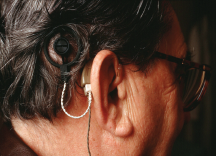 TRIO Best Practice articles are brief, structured reviews designed to provide the busy clinician with a handy outline and reference for day-to-day clinical decision making. The ENTtoday summaries below include the Background and Best Practice sections of the original article. To view the complete Laryngoscope articles free of charge, visit Laryngoscope.
TRIO Best Practice articles are brief, structured reviews designed to provide the busy clinician with a handy outline and reference for day-to-day clinical decision making. The ENTtoday summaries below include the Background and Best Practice sections of the original article. To view the complete Laryngoscope articles free of charge, visit Laryngoscope.
Explore This Issue
December 2019Background
By 2050, the proportion of people over the age of 60 years will double. Coincident with age-related declines in hearing are declines in cognitive functions. Moreover, cognitive losses beyond those associated with normal aging are found in 20% of adults over 70 years of age, with frank dementia in 5% of patients between 70 and 80 years of age and 37% of patients over 90 years of age.
Multiple studies have begun to demonstrate an association of SNHL with cognitive declines. In fact, SNHL is now considered the largest modifiable risk factor in midlife for later development of dementia. The impact of intervention for SNHL, however, either through hearing aids (HAs) or cochlear implants, (CIs) remains unclear. Although there is mounting evidence that HAs result in improved cognitive function in this population, less research has been done in adults receiving CIs. This Triological Society Best Practice statement summarizes what is known regarding the impact of CIs on cognitive function.
Best Practice
 Although not wholly conclusive, there appear to be consistently demonstrated improvements in attention, episodic, and working memory, as well as processing speed in new CI users, even after as little as six months experience with their devices. Nonetheless, these studies still suffer from some important limitations. First, the long-term benefits to cognition are unclear, with most studies limited to repeat testing at six or 12 months after implantation. Second, many patients receive some degree of therapeutic “rehabilitation” after CI beyond simple restoration of audibility through an implant, such as through clinician-guided auditory training, computerized training programs, or audiobooks. Third, many of these studies did not include a control group, with the exception of the Jayakody et al. study. Fourth, inappropriate utilization of measures that are delivered auditorily (or audiovisually) by a neuropsychologist may overestimate the severity of cognitive dysfunction by patients with severe hearing loss, thus falsely inflating any improvements demonstrated after audibility is restored through a CI. Fifth, none of the studies to date have included patients with clinically diagnosed cognitive impairment or dementia, so it is unclear if CI can impact cognitive functioning in patients with baseline impairment. Finally, and perhaps most importantly, the mechanisms underlying any changes in cognitive functions because of CI remain poorly defined and underexplored (Laryngoscope. 2019;129:2208–2209).
Although not wholly conclusive, there appear to be consistently demonstrated improvements in attention, episodic, and working memory, as well as processing speed in new CI users, even after as little as six months experience with their devices. Nonetheless, these studies still suffer from some important limitations. First, the long-term benefits to cognition are unclear, with most studies limited to repeat testing at six or 12 months after implantation. Second, many patients receive some degree of therapeutic “rehabilitation” after CI beyond simple restoration of audibility through an implant, such as through clinician-guided auditory training, computerized training programs, or audiobooks. Third, many of these studies did not include a control group, with the exception of the Jayakody et al. study. Fourth, inappropriate utilization of measures that are delivered auditorily (or audiovisually) by a neuropsychologist may overestimate the severity of cognitive dysfunction by patients with severe hearing loss, thus falsely inflating any improvements demonstrated after audibility is restored through a CI. Fifth, none of the studies to date have included patients with clinically diagnosed cognitive impairment or dementia, so it is unclear if CI can impact cognitive functioning in patients with baseline impairment. Finally, and perhaps most importantly, the mechanisms underlying any changes in cognitive functions because of CI remain poorly defined and underexplored (Laryngoscope. 2019;129:2208–2209).